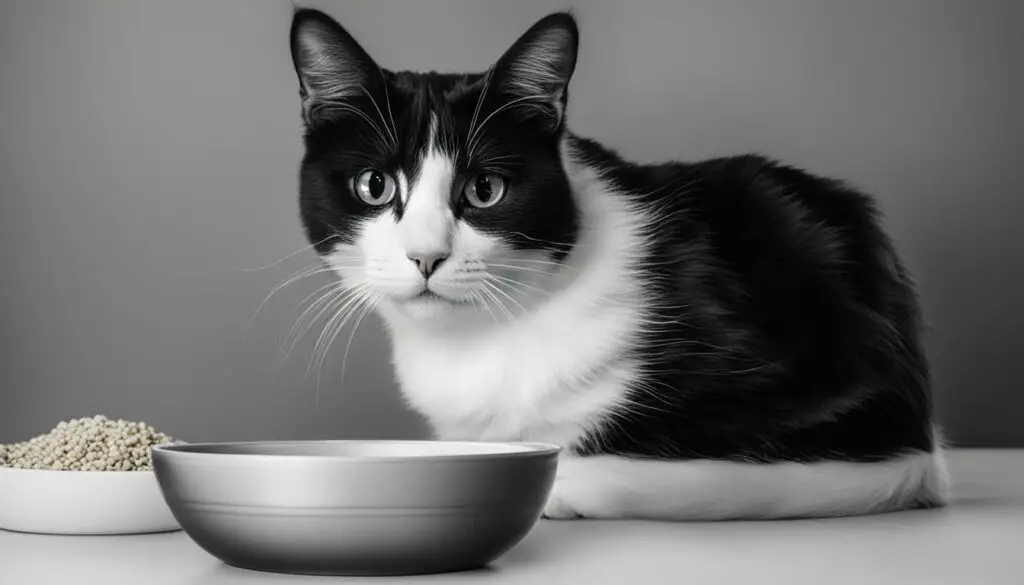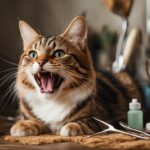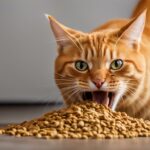Is your cat not eating? As a pet owner, it can be concerning when your feline companion refuses to eat. But don’t worry, there are various reasons why a cat might have a decrease in appetite, and several strategies you can try to encourage them to eat again.
Illness is one of the most common underlying causes for a cat to stop eating. Dental or tooth pain, gastrointestinal issues, kidney disease, pancreatitis, and digestive obstruction are some potential culprits. Other factors like recent vaccination or medication, anxiety, stress, depression, new food, and slowing metabolism can also affect a cat’s appetite.
It’s important to monitor their behavior and consult a vet if they haven’t eaten in a day or more. While cats can go without food for about two weeks, prolonged lack of nutrition weakens them, so timely intervention is crucial.
Key Takeaways:
- Illness, dental issues, gastrointestinal problems, kidney disease, and pancreatitis can contribute to a cat’s decreased appetite.
- Factors like recent vaccination, medication, anxiety, stress, depression, new food, and slowing metabolism can also affect a cat’s appetite.
- Consulting a veterinarian is recommended if a cat refuses to eat for more than a day or displays other symptoms or behavioral changes.
- Strategies such as providing a quiet eating area, offering wet food or meat baby food, and warming the food can help encourage a cat to eat.
- Monitoring a cat’s eating habits and seeking veterinary care can help diagnose the underlying cause of appetite loss and determine the best course of treatment.
Section 2: Common Causes of Appetite Loss in Cats
When a cat stops eating, it can be a cause for concern. There are several common factors that can contribute to a cat’s appetite loss due to illness. Dental issues such as infections, inflamed gums, broken teeth, or oral tumors can cause pain while eating, leading to a decreased appetite. Gastrointestinal problems like parasites, colitis, gastroenteritis, or even cancer can also affect a cat’s ability or desire to eat. Kidney disease, pancreatitis, digestive obstruction, indigestion, or constipation are other potential contributors to appetite loss.
Aside from physical ailments, cats can also experience appetite loss due to anxiety, stress, or depression. Major changes in routine or home environment, as well as being introduced to new food, can trigger these emotional states and result in a decreased appetite. Additionally, as cats age, their metabolism may slow down, leading to a decreased interest in food. Outdoor cats may also find alternative food sources while roaming, which can reduce their appetite for regular meals.
It is important to monitor a cat’s eating habits and consult a veterinarian if appetite loss persists or if other symptoms or behavioral changes are observed. Proper diagnosis and treatment by a professional can help address the underlying causes of appetite loss and ensure the cat’s overall health and well-being.
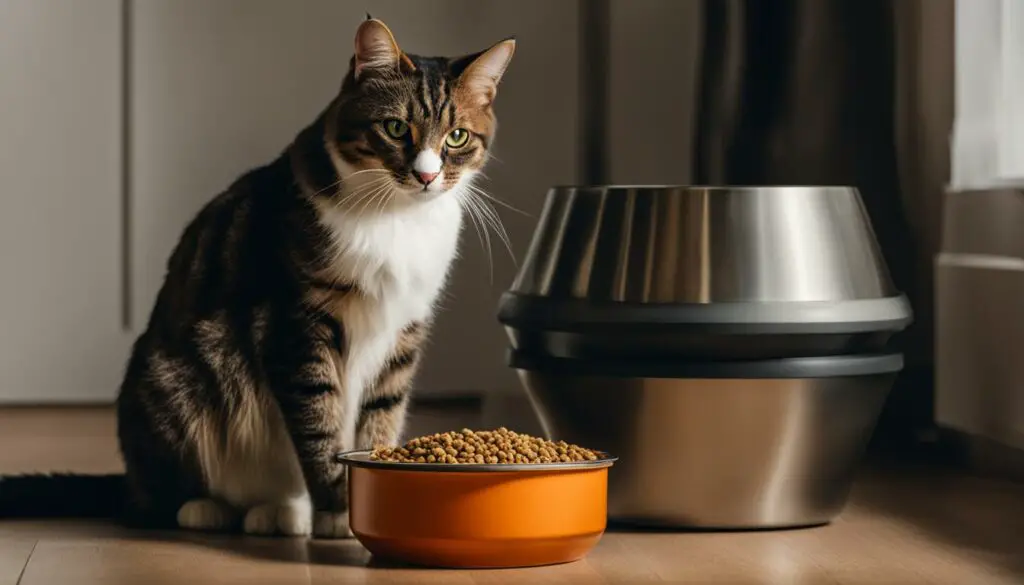
Dental Issues:
| Dental Issues | Contributing Factors |
|---|---|
| Infections | Pain while eating |
| Inflamed gums | Difficulty chewing |
| Broken teeth | Painful chewing |
| Oral tumors | Obstructed eating |
Gastrointestinal Problems:
| Gastrointestinal Problems | Contributing Factors |
|---|---|
| Parasites | Digestive discomfort |
| Colitis | Inflammation of the colon |
| Gastroenteritis | Inflammation of the gastrointestinal tract |
| Cancer | Impaired digestion |
Other Contributing Factors:
- Anxiety and stress
- Depression
- Major changes in routine or home environment
- Introducing new food
- Slowing metabolism
- Outdoor cat finding alternative food
How Long Can a Cat Go Without Eating?
When it comes to appetite loss in cats, many pet owners may wonder how long their feline friend can go without eating. While cats are known for their ability to survive without food for extended periods of time, it is important to understand the impact of prolonged appetite loss on their overall health and well-being.
On average, a cat can survive for about two weeks without eating. However, it is essential to note that as time goes on, the absence of proper nutrition weakens the cat’s body and puts them at risk for various health complications. Therefore, it is crucial to intervene and seek veterinary care if a cat refuses to eat for more than a day.
Cats have a higher tolerance for fasting compared to other animals, but they should not go without drinking water for more than three days. Dehydration can lead to significant health issues and exacerbate the effects of appetite loss.
| Duration | Effect on the Cat’s Body |
|---|---|
| 1-3 days | Minimal impact on the cat’s health. Keep an eye on their behavior and offer enticing food options. |
| 3-5 days | The cat’s body starts breaking down fats for energy. Dehydration becomes a concern. |
| 5-7 days | The cat may experience muscle wasting and electrolyte imbalances. Organs may begin to suffer damage. |
| 7-10 days | The cat’s body enters a state of starvation, leading to severe weakness and potential organ failure. |
| 10-14+ days | The cat’s body is in a critical state, and without intervention, death becomes a possibility. |
It is important to remember that these are general guidelines, and each individual cat may have different responses to prolonged fasting. Timely intervention and veterinary care are crucial to ensure the well-being and health of the cat.
Tips to Encourage a Cat to Eat
If your cat is not eating, it’s important to take action to entice them to eat and ensure their overall well-being. Here are some tips to encourage a cat to eat:
- Provide a quiet eating area: Cats can be easily stressed or distracted while eating. Find a calm and peaceful place for their meals where they can eat without disturbances.
- Offer wet food or meat baby food: Wet food is generally more appealing to cats due to its strong aroma and palatability. You can also try offering small amounts of meat baby food, which can be more enticing for cats who are being picky.
- Warm the food: Cats might prefer food that is slightly warmed. Heating their meal for a few seconds in the microwave or adding warm water can enhance the aroma and make it more appealing.
- Add tuna juice: Tuna juice from a can can be added to your cat’s food to boost the flavor and entice them to eat. Just be sure to use tuna packed in water, not oil.
It’s important to keep in mind your cat’s food preferences and specific needs. Some cats may have dietary restrictions or sensitivities, so consult with your veterinarian if you have any concerns. Additionally, maintaining proper food hygiene, such as keeping their bowls clean and fresh, can also encourage your cat to eat.
Remember, every cat is unique, so it may take some trial and error to find the right strategies that work for your feline companion. If your cat’s appetite loss persists or if you notice other concerning symptoms or behavioral changes, it’s crucial to seek veterinary care for a thorough evaluation and appropriate treatment.
| Tip | Description |
|---|---|
| Provide a quiet eating area | Find a calm and peaceful place for your cat’s meals. |
| Offer wet food or meat baby food | Wet food and meat baby food can be more enticing for cats. |
| Warm the food | Heating the food slightly can enhance the aroma and make it more appealing. |
| Add tuna juice | Tuna juice can boost the flavor and entice your cat to eat. |
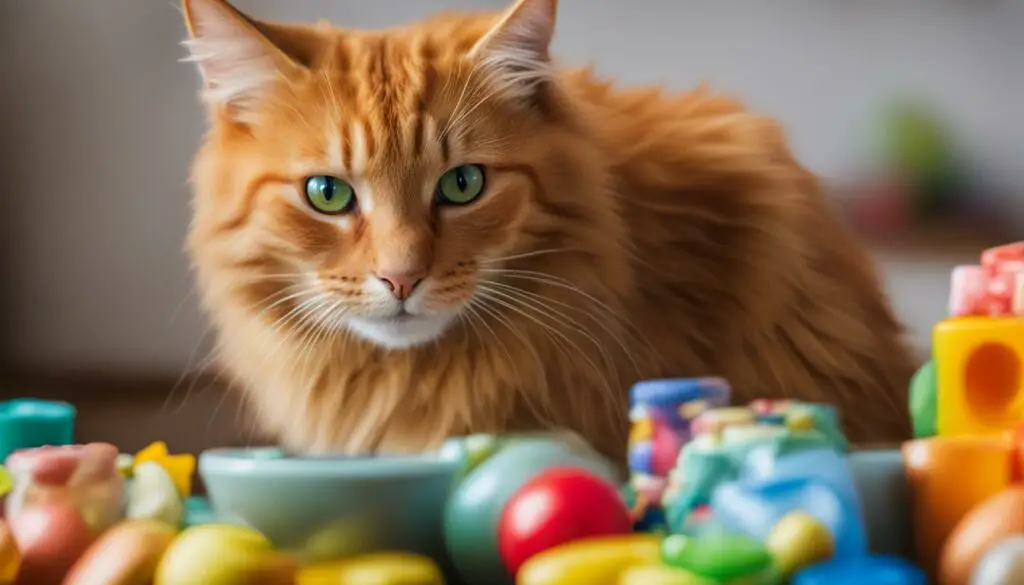
By using these tips and being attentive to your cat’s needs, you can help encourage them to eat and ensure they receive the necessary nutrition for their health and well-being.
When to Consult a Veterinarian for a Cat’s Appetite Loss
If your cat is experiencing appetite loss and refuses to eat for more than 24 hours, it is crucial to consult a veterinarian. Appetite loss in cats can often indicate serious underlying medical concerns that require prompt attention. Regular monitoring of your cat’s eating habits and behavior is essential to catch any potential issues early.
In addition to the duration of appetite loss, it is important to observe if your cat is also not drinking water. Dehydration can further worsen their condition and lead to more severe health complications. Keep an eye out for other symptoms or behavioral changes such as weight loss, lethargy, vomiting, or diarrhea, as these can also indicate underlying health issues.
A veterinary examination is necessary to determine the cause of appetite loss and establish an appropriate course of treatment. The veterinarian will conduct a thorough physical examination, review your cat’s medical history, and may perform additional diagnostic tests such as blood work, X-rays, or ultrasound scans to identify the underlying cause.
Early intervention and proper veterinary care are crucial in addressing appetite loss in cats and ensuring their overall well-being. Don’t hesitate to reach out to your veterinarian if you have any concerns about your cat’s eating habits or notice any changes in their behavior.
Dietary Changes and Stress as Factors Contributing to Appetite Loss
When it comes to a cat’s appetite loss, there are several factors that can contribute to this issue. Dietary changes are one such factor that can impact a cat’s eating habits. Abruptly introducing new food may cause cats to refuse to eat. To alleviate this problem, it is recommended to gradually transition to new food, allowing the cat to adjust at their own pace.
Stress is another significant factor that can cause appetite loss in cats. Major changes in routine or home environment can trigger anxiety and stress, leading to a decreased desire to eat. Cats thrive in familiar and comfortable surroundings, so disruptions or alterations can have a negative impact on their eating habits. Providing a calm and stable environment for cats can help alleviate stress-related appetite loss.
“Stress is another significant factor that can cause appetite loss in cats.”
Managing Appetite Loss due to Dietary Changes and Stress
When a cat experiences appetite loss due to dietary changes or stress, there are several strategies that can be employed to help them regain their appetite. Firstly, it is important to create a calm and quiet eating area that is free from distractions. Cats are more likely to eat when they feel safe and secure.
Additionally, offering wet food or meat baby food can entice cats to eat due to their enticing texture and smell. Warming the food slightly can make it more appealing, but it is crucial to mix the food well after heating to avoid any hot spots that could burn their sensitive mouths.
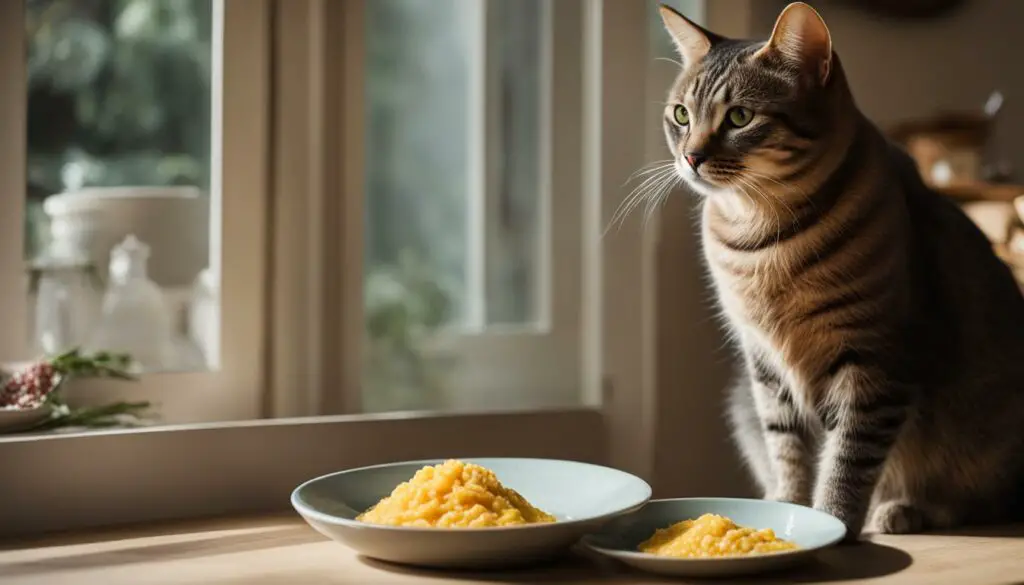
| Strategies to Encourage Eating | Benefits |
|---|---|
| Providing a calm eating area | Reduces stress and anxiety |
| Offering wet food or meat baby food | Enticing texture and aroma |
| Warming the food slightly | Makes it more appealing |
It is important to monitor the cat’s response to these strategies and make adjustments as necessary. If appetite loss persists despite these efforts or if there are any other concerning symptoms or behavioral changes, it is advisable to consult a veterinarian for further guidance and examination.
Dental Issues as a Cause of Appetite Loss in Cats
When it comes to appetite loss in cats, dental issues can be a significant factor. Cats with dental problems often experience pain and discomfort while eating, leading to a loss of appetite. Conditions such as inflamed gums, dental infections, broken teeth, oral tumors, and dental abscesses can all contribute to this issue.
To address dental issues in cats, it is essential to prioritize regular dental care and seek professional veterinary attention. Regular dental cleanings, oral examinations, and potential tooth extractions or treatments can help alleviate pain and restore a cat’s ability to eat comfortably.
To prevent dental problems in cats, it is crucial to provide them with proper dental hygiene. This includes regular brushing of their teeth, offering dental treats or toys, and using dental-specific cat food or supplements. By taking care of their dental health, we can minimize the risk of appetite loss and ensure the overall well-being of our feline companions.
| Dental Issues | Contributing Factors | Symptoms |
|---|---|---|
| Inflamed gums | Poor oral hygiene, periodontal disease | Redness, swelling, bleeding gums |
| Dental infections | Poor oral hygiene, tooth decay | Pus, bad breath, pain while eating |
| Broken teeth | Accidents, trauma | Pain, sensitivity, difficulty chewing |
| Oral tumors | Genetic factors, oral cancer | Lumps, growths, difficulty eating |
| Dental abscesses | Bacterial infections, tooth decay | Pain, swelling, discharge |
| Dental hygiene | Regular brushing, dental treats | Prevents plaque buildup and gum diseases |
“Proper dental care is essential to ensure your cat’s oral health and overall well-being.”
Gastrointestinal Problems and Appetite Loss in Cats
When a cat experiences gastrointestinal issues, it can often result in appetite loss. Gastrointestinal problems can range from parasites and colitis to gastroenteritis and even cancer. These conditions can cause discomfort, pain, and inflammation in the digestive tract, making it difficult for cats to eat normally. It is crucial to address these issues promptly to ensure the cat’s overall health and well-being.
The following table provides an overview of common gastrointestinal problems that can contribute to appetite loss in cats:
| Gastrointestinal Issues | Common Symptoms |
|---|---|
| Parasites | Weight loss, diarrhea, vomiting |
| Colitis | Abdominal pain, bloody stools, decreased appetite |
| Gastroenteritis | Nausea, vomiting, diarrhea, loss of appetite |
| Cancer | Weight loss, vomiting, diarrhea, decreased appetite |
Preventing and Managing Gastrointestinal Problems
Prevention and management of gastrointestinal issues in cats are essential for maintaining their appetite and overall health. Here are some tips to help prevent and manage gastrointestinal problems:
- Ensure regular deworming and flea control to prevent parasite-related gastrointestinal issues.
- Feed your cat a balanced diet that is appropriate for their age and health condition.
- Avoid sudden diet changes and introduce new food gradually.
- Keep your cat’s food and water bowls clean to prevent bacterial contamination.
- Provide a stress-free environment for your cat to minimize anxiety and reduce the risk of gastrointestinal problems.
“Proper care and attention to a cat’s gastrointestinal health can help prevent appetite loss and ensure their overall well-being.” – Dr. Emily Johnson, Veterinarian
If your cat is experiencing appetite loss and gastrointestinal issues, it is important to consult a veterinarian for an accurate diagnosis and appropriate treatment. Your veterinarian can prescribe medications, recommend dietary changes, or perform further tests to identify the underlying cause of the problem.
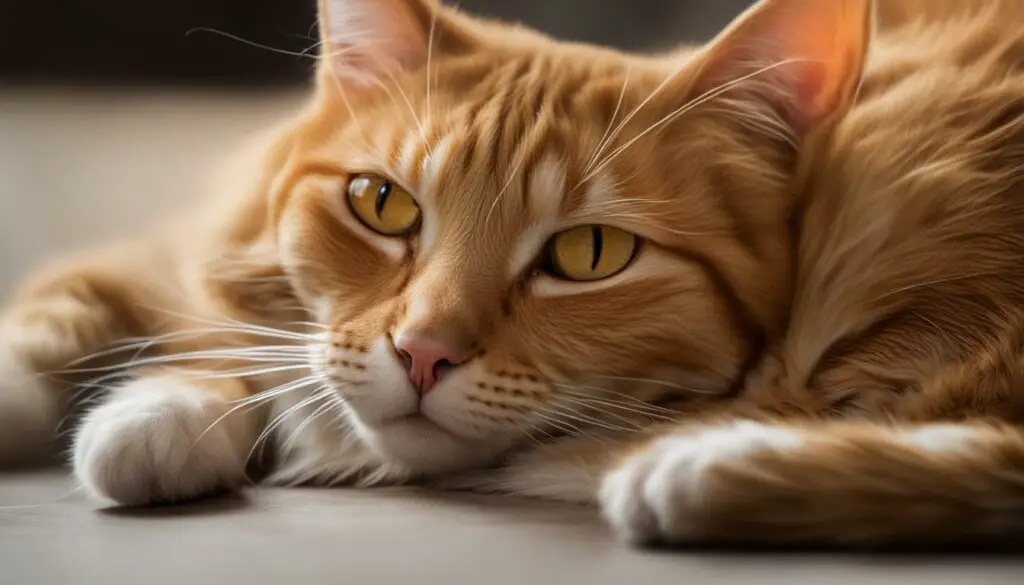
Kidney Disease and Appetite Loss in Cats
Kidney disease is a common ailment in cats, particularly among older cats. It can cause extreme nausea and lead to appetite loss. Cats with kidney disease may also experience weight loss and increased thirst. Regular monitoring of a cat’s eating habits is essential to detect appetite loss early. If a cat shows signs of decreased appetite, it is important to consult a veterinarian for proper diagnosis and treatment.
Kidney disease in cats can be managed through a combination of dietary changes and medications. Prescription diets that are specifically formulated for cats with kidney disease can help reduce the workload on the kidneys and support overall kidney health. These diets are low in phosphorus and protein, and they may also be formulated to control other symptoms such as high blood pressure or urinary issues. Medications may also be prescribed to manage complications associated with kidney disease and improve a cat’s quality of life.
It is important to note that kidney disease is a progressive condition, meaning that it cannot be cured. However, with early detection and proper management, cats with kidney disease can still lead a good quality of life. Regular check-ups with a veterinarian and adherence to the prescribed treatment plan are crucial in managing the disease and minimizing appetite loss.
Table: Symptoms of Kidney Disease in Cats
| Symptom | Description |
|---|---|
| Appetite Loss | Cats with kidney disease may experience a decreased appetite or even complete loss of appetite. |
| Nausea | Kidney disease can cause extreme nausea in cats, leading to further appetite loss. |
| Weight Loss | Unexplained weight loss is a common symptom of kidney disease in cats. |
| Increased Thirst and Urination | Kidney disease can cause excessive thirst and frequent urination in cats. |
| Poor Coat Condition | Changes in the texture or appearance of the cat’s fur may be indicative of kidney disease. |
Pancreatitis and Appetite Loss in Cats
One possible cause of appetite loss in cats is pancreatitis, which is the inflammation or infection of the pancreas. Cats with pancreatitis may experience abdominal pain, nausea, and a decreased appetite. This condition can be diagnosed by a veterinarian through physical examination, blood tests, and imaging techniques such as ultrasound or X-rays.
The inflamed pancreas affects the production of digestive enzymes, leading to poor digestion and nutrient absorption. Cats with pancreatitis may show signs of weight loss and lethargy in addition to their decreased appetite. It is important to seek veterinary care to manage pancreatitis and alleviate symptoms.
While the exact causes of pancreatitis in cats are not always clear, some potential risk factors include obesity, high-fat diets, certain medications, infections, or immune system disorders. Treatment for pancreatitis in cats typically involves supportive care, including fluid therapy, pain management, and a low-fat diet. In severe cases, hospitalization may be necessary.
“Pancreatitis can be a serious condition in cats, and it is crucial to seek veterinary care if you suspect your cat may be suffering from this condition. Early diagnosis and proper treatment can greatly improve the prognosis and quality of life for your furry friend.”
| Symptoms of Pancreatitis in Cats | Treatment Options |
|---|---|
|
|
Indigestion and Digestive Obstruction as Factors in Appetite Loss
When it comes to appetite loss in cats, indigestion and digestive obstruction can play a significant role. Cats may experience indigestion due to various factors, including dietary changes, ingestion of inappropriate substances, or even underlying medical conditions. Indigestion can cause discomfort and pain, leading to a loss of appetite in cats. Additionally, digestive obstruction occurs when foreign bodies obstruct the gastrointestinal tract, preventing the proper digestion and absorption of food. Cats with digestive obstruction may exhibit symptoms such as vomiting and diarrhea.
| Signs of Indigestion in Cats | Signs of Digestive Obstruction in Cats |
|---|---|
| – Nausea | – Persistent vomiting |
| – Flatulence (excessive gas) | – Inability to pass stool |
| – Diarrhea or loose stools | – Abdominal discomfort or pain |
| – Lack of appetite | – Lethargy or weakness |
If your cat is experiencing indigestion or digestive obstruction, it is important to seek veterinary care immediately. A veterinarian can diagnose the underlying cause and recommend appropriate treatment options. Treatment may include dietary changes, medication to alleviate symptoms, or, in severe cases, surgical intervention to remove the obstruction.
In cases of digestive obstruction, timely intervention is crucial to prevent further complications and ensure the well-being of your feline companion.
Prevention is key when it comes to indigestion and digestive obstruction in cats. It is essential to provide a safe and cat-friendly environment, free from objects or substances that could be ingested and cause digestive issues. Additionally, feeding your cat a balanced and appropriate diet, free from toxic or indigestible ingredients, can help reduce the risk of indigestion and obstruction.
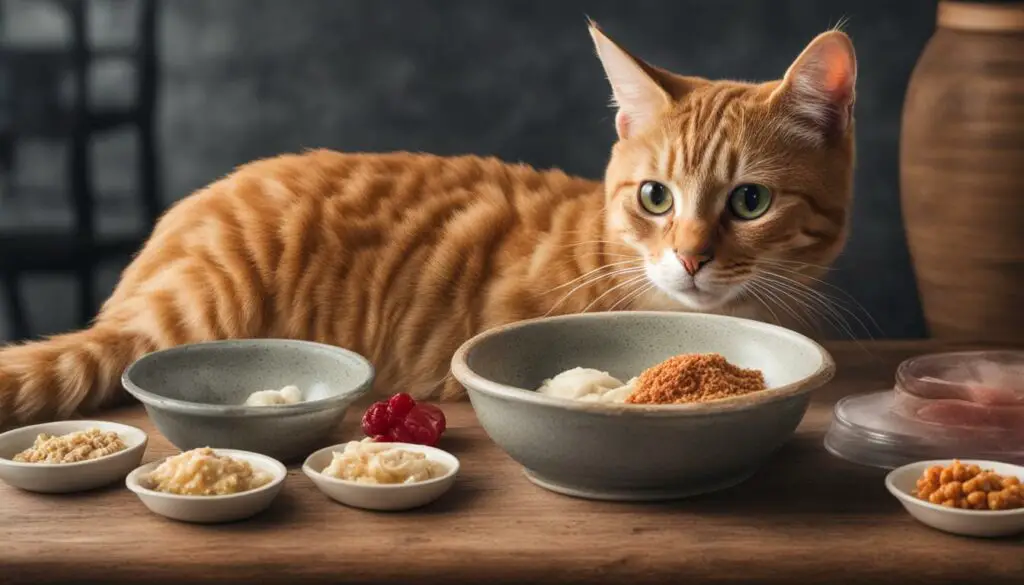
In conclusion, indigestion and digestive obstruction can significantly impact a cat’s appetite. Recognizing the signs and seeking prompt veterinary care is crucial for proper diagnosis and treatment. By providing a safe environment and a nutritious diet, you can help prevent these issues and ensure your cat’s overall well-being.
Anxiety, Stress, and Depression’s Impact on a Cat’s Appetite
When it comes to our feline friends, it’s important to remember that they, too, can experience emotions like anxiety, stress, and even depression. Just like humans, these emotional states can have a significant impact on a cat’s appetite. Major changes in their routine or home environment, such as moving to a new house or the addition of a new family member, can trigger these emotions and result in a loss of appetite.
Cats are creatures of habit, and disruptions or alterations to their familiar and comfortable surroundings can affect their eating habits. If you notice that your cat’s appetite has diminished and you suspect it may be due to anxiety, stress, or depression, it’s important to take steps to provide a calm and stable environment for your furry friend. This may include creating a quiet space where they can eat without distractions, minimizing changes in their routine as much as possible, and providing plenty of love and attention to help alleviate their emotional distress.
If your cat’s appetite loss persists despite these environmental adjustments, it’s recommended to consult with a veterinarian. They can help determine if there are any underlying medical issues contributing to the appetite loss and provide further guidance on how to support your cat’s overall well-being.
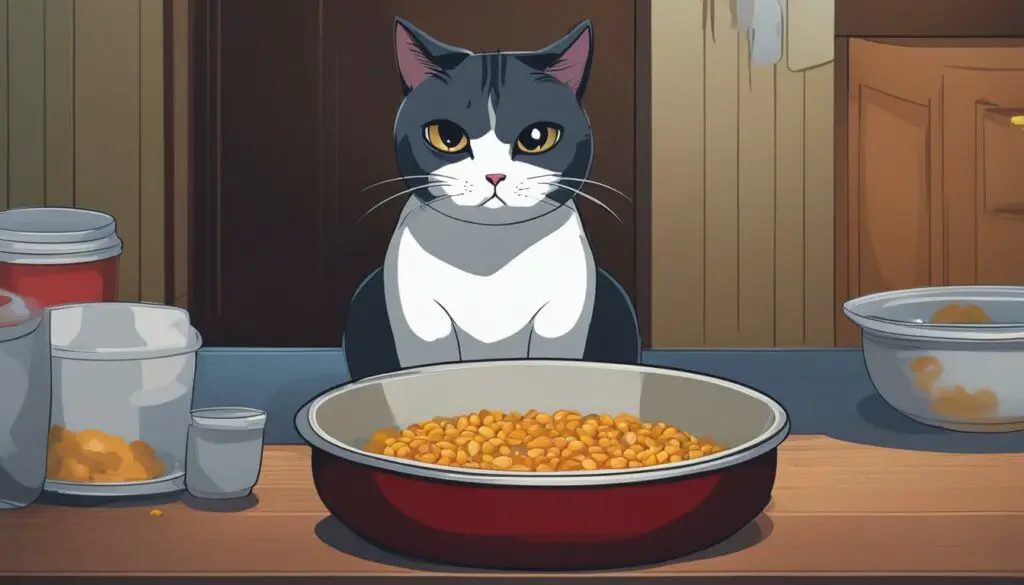
Understanding the Link Between Routine Changes and Appetite Loss
Changes in a cat’s routine can have a significant impact on their appetite. Cats thrive on predictability and familiarity, and sudden disruptions to their daily schedule can cause stress and anxiety, leading to a decrease in their desire to eat.
For example, if you’ve recently moved to a new home or made significant changes to your existing living space, your cat may be feeling unsettled and uncertain. This can result in a loss of appetite as they adjust to their new surroundings.
To help your cat during times of routine changes, it’s essential to provide them with a sense of security and stability. Maintain a consistent feeding schedule, set aside a dedicated area for their meals, and offer them plenty of reassurance and affection. Gradually introducing any new changes to their routine can also help them feel more at ease.
Creating a Safe and Calm Home Environment for Your Cat
A tranquil and stress-free home environment is crucial for your cat’s overall well-being, including their appetite. Here are some tips to create a safe and calm space for your feline companion:
- Provide a quiet and secluded area for your cat’s meals, away from noisy appliances or high-traffic areas.
- Ensure they have a cozy and comfortable bed or hiding spot where they can retreat when they need some alone time.
- Use calming aids such as pheromone diffusers or calming music specifically designed for cats to help reduce anxiety and stress.
- Offer plenty of mental and physical stimulation through interactive toys, scratching posts, and playtime to keep them engaged and content.
By creating a safe and calm home environment, you can help alleviate anxiety, stress, and depression in your cat, which, in turn, can positively influence their appetite and overall health.
Metabolism and Outdoor Cat Eating Habits
As cats age, their metabolism naturally slows down, which can contribute to a decrease in appetite. Just like humans, cats experience changes in their bodies as they get older, including a decrease in muscle mass and energy expenditure. These changes can affect their overall caloric needs and lead to a reduced desire for food. It’s important for cat owners to understand these metabolic changes and adjust their cat’s diet accordingly to ensure they receive the appropriate nutrition.
Outdoor cats also have unique eating habits that can impact their appetite. When cats have access to the outdoors, they may engage in hunting and scavenging behaviors to find alternative food sources. This can result in a decreased interest in their regular meals, as they may be obtaining nutrients from other sources. Additionally, outdoor cats may also experience changes in their routine or home environment, which can cause stress and anxiety, further affecting their appetite. It’s important for cat owners to be aware of these factors and monitor their outdoor cats’ eating habits closely.
| Factors | Impact |
|---|---|
| Slowing metabolism | Decreased appetite |
| Outdoor environment | Alternative food sources |
| Routine changes | Influence on eating habits |
Dietary Considerations for Older Cats
When addressing appetite loss in older cats, it’s important to provide a diet that meets their changing needs. As their metabolism slows down, their calorie requirements may decrease. Choosing a high-quality, age-appropriate cat food that is formulated for senior cats can help ensure they receive the necessary nutrients while adjusting to their reduced appetite. Additionally, adding moisture to their diet through wet food or providing access to fresh water can help support their overall health and digestion. Regular veterinary check-ups can also help monitor the cat’s weight and identify any potential health issues.
In conclusion, understanding the impact of slowing metabolism and outdoor cat eating habits is essential when addressing appetite loss in cats. Adjusting their diet and providing the appropriate nutritional support can help manage appetite issues and ensure their overall well-being. Additionally, monitoring outdoor cats’ eating habits and addressing any changes in routine or environment can help alleviate stress and encourage a healthy appetite. By being attentive to these factors, cat owners can support their feline companions and maintain their health as they age.
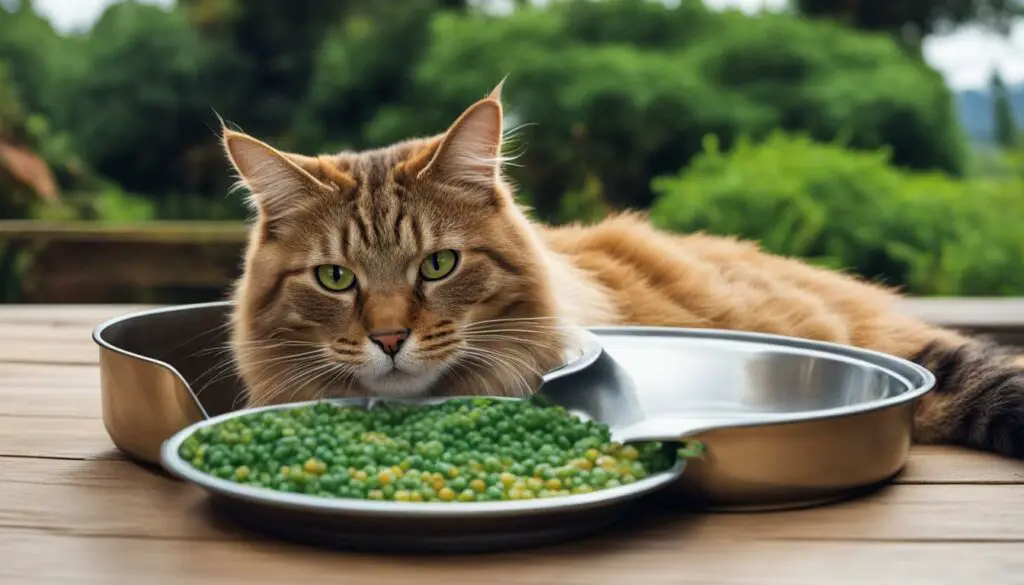
Conclusion
In conclusion, a cat’s appetite loss can be caused by various factors, including illness, dental issues, gastrointestinal problems, kidney disease, pancreatitis, anxiety, stress, depression, metabolic changes, and external influences such as new food or outdoor scavenging habits.
To address cat appetite loss, it is important to monitor their eating habits closely and consult a veterinarian if they refuse to eat for more than 24 hours or exhibit other concerning symptoms or behavioral changes. Strategies that can help entice cats to eat include providing a quiet eating area, offering wet food or meat baby food, keeping bowls clean, and adjusting food temperature to their preference.
However, if the appetite loss persists or worsens, seeking professional veterinary care is recommended to diagnose the underlying cause and determine the best course of treatment. Remember, timely intervention is crucial to prevent complications and maintain your cat’s overall health and well-being.
By understanding the potential causes and implementing appropriate strategies, you can help your cat regain their appetite and ensure they receive the necessary nutrition for a happy and healthy life.
FAQ
What are the common causes of appetite loss in cats?
The common causes of appetite loss in cats can include dental issues, gastrointestinal problems, kidney disease, pancreatitis, anxiety, stress, depression, new food, or slowing metabolism.
How long can a cat go without eating?
Cats can go without eating for about two weeks, but it is important to seek veterinary care if a cat hasn’t eaten in a day or more.
What can I do to encourage my cat to eat?
Some strategies to encourage a cat to eat include providing a quiet eating area, offering wet food or meat baby food, warming the food, or adding the juice from a tuna can.
When should I consult a veterinarian for my cat’s appetite loss?
It is recommended to consult a veterinarian if your cat refuses to eat for more than 24 hours or if other symptoms or behavioral changes are observed.
Can dietary changes or stress affect a cat’s appetite?
Yes, dietary changes and stress can impact a cat’s appetite. Gradual transitions to new food and maintaining a calm and stable environment can help alleviate these issues.
How can dental issues contribute to appetite loss in cats?
Dental issues such as infections, inflamed gums, broken teeth, or oral tumors can cause eating or chewing pain, leading to appetite loss in cats.
What gastrointestinal problems can cause appetite loss in cats?
Gastrointestinal issues like parasites, colitis, gastroenteritis, or cancer can affect a cat’s appetite and lead to appetite loss.
Can kidney disease contribute to appetite loss in cats?
Yes, kidney disease can cause extreme nausea and lead to appetite loss in cats. Monitoring their eating habits and seeking veterinary care is crucial in managing kidney disease.
How does pancreatitis affect a cat’s appetite?
Pancreatitis, inflammation or infection of the pancreas, can cause abdominal pain, nausea, and reduced appetite in cats.
Can indigestion or digestive obstruction lead to appetite loss in cats?
Yes, indigestion or digestive obstruction can cause discomfort, vomiting, diarrhea, and appetite loss in cats. Prompt veterinary attention is necessary to address these issues.
Can anxiety, stress, or depression affect a cat’s appetite?
Yes, major changes in routine or home environment, as well as anxiety, stress, or depression, can contribute to appetite loss in cats. Providing a calm and stable environment is important.
Does metabolism play a role in a cat’s appetite loss?
As cats age, their metabolism may slow down, which can lead to decreased appetite. Adjusting their diet accordingly can help manage appetite loss.
Do outdoor cat eating habits affect appetite?
Yes, outdoor cats may find alternative food sources while roaming, which can reduce their interest in regular meals.
What is the best way to address a cat’s appetite loss?
It is important to monitor a cat’s behavior, consult a veterinarian, and follow their recommended course of treatment to address appetite loss in cats.

